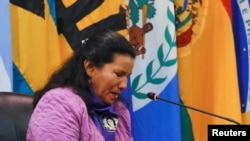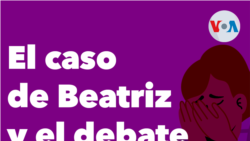The two hearings held this week at the Inter-American Court of Human Rights in Costa Rica, in which judges heard the arguments of reproductive rights organizations in El Salvador and the Salvadoran State, generated polarization outside the court with activists for and against abortion .
It was the first time that a case of this type reached an international court. This is a lawsuit that began in 2013 between the Salvadoran State and the family of 22-year-old Beatriz Delmy, whose fetus was growing with anomalies incompatible with life and unsuccessfully asked the authorities of her country to have a fetus performed on her. legal and safe abortion after being diagnosed with lupus and rheumatoid arthritis.
El Salvador penalizes abortion without exception since 1998. Beatriz died four years after giving birth to the child who only lived 5 hours.
“When there is a risk to the life of the mother, the different hospitals have codes and they know it, even in El Salvador. There was no danger to Beatriz and, for that reason, the abortion was not performed,” he told the VOARuby Mendoza, a Costa Rican activist who was among the protesters outside the Court who addressed the controversial case between Wednesday and Thursday.
Mariana Moisa, a Salvadoran anthropologist and feminist who followed the arguments of the parties on a large screen located outside the Court, seemed surprised by the mobilization that surrounded her on Thursday afternoon. She said protesters representing conservative groups carrying light blue flags and banners reading ‘Pro-Life’ were “very violent people”.
“They have hurt compañeras, they have beaten me with what they had, with flags. We never imagined that these groups would be so virulent and violent, ”she added about pro-life protesters who arrived with crucifixes and images of virgins and began to pray.
These hearings further revived the debate in El Salvador on the issue of abortion. The conservative deputy and former presidential candidate of Costa Rica, Fabricio Alvarado, came to the Court to deliver a statement in which he asked “that life be respected.” He also said that “Latin America is pro-life.”
The controversial case has also fueled the debate in Central America and now the Court must assess whether the decision of the Salvadoran State violated the integrity of the young woman.
Matthew Redondo Vásquez, a protester against the decriminalization of abortion told the VOA that he, together with the group that accompanied him, appeared outside the Court to “do justice” for Beatriz and accused the activists of being “manipulative groups that receive certain sponsorships from very large entities.”
“They are misrepresenting the term about justice over Beatriz. Beatriz loved her daughter, she had her daughter in her arms, Beatriz gave her mother’s love to her daughter. Sadly, due to the situation that Beatriz’s daughter had, she passed away, ”she stressed.
Although the man acknowledges that Beatriz “did not have the best medical advice,” he adds that “sadly the family’s pain has been manipulated. This case has been misrepresented in another way.”
Feminists from the region join Beatriz’s request
María Teresa Blandón, a well-known feminist in Nicaragua, appeared before the Court to support Beatriz’s petition for justice, since she assures that the Salvadoran State “violated all of Beatriz’s rights, to health and to life.”
Blandón regretted the presence of people who call themselves “pro-life” since “the most fundamentalist groups do not deserve any respect for them.”
“What they have shown here is that: an enormous lack of empathy and compassion for Beatriz’s suffering,” says Blandón, adding that these people “never said, for example, throughout her speech, that Beatriz did have a severe illness, that Beatriz was informed that her pregnancy not only aggravated her state of health, but that it was unfeasible because Beatriz’s baby came without a brain”.
“We here heard these groups say that they thanked God because Beatriz had been able to hug her girl who died five hours after being born. They don’t really care that the girl spent many months first with the health problems that pregnancy caused her.”
It added that the pregnancy was “unviable and the State was torturing her, forcing her to continue with the pregnancy.”
“It seems to us that, in reality, it is not fair, it is not ethical to pretend that women have to face this type of unnecessary suffering,” Blandón concluded.
Bukele government active in the debate
In the prelude to the Court hearing, the ruling party in El Salvador was activated on Twitter in support of maintaining the ban on abortion.
“Let it be completely clear: as long as Nuevas Ideas is a majority in the Legislative Assembly, there is not the slightest possibility that abortion will be legalized in El Salvador,” the president of the Legislative Assembly and personal friend of President Bukele wrote on Twitter. Ernest Castro.
“We will always respect what the Constitution indicates, not what some organizations want to impose on us from abroad,” Castro added.
Connect with the Voice of America! Subscribe to our channel Youtube and activate notifications, or follow us on social networks: Facebook, Twitter and Instagram.

















